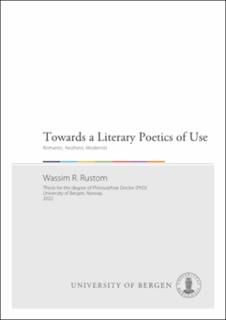| dc.contributor.author | Rustom, Wassim R. | |
| dc.date.accessioned | 2022-08-16T12:10:07Z | |
| dc.date.available | 2022-08-16T12:10:07Z | |
| dc.date.issued | 2022-09-09 | |
| dc.date.submitted | 2022-08-08T13:30:34.688Z | |
| dc.identifier | container/9c/68/77/33/9c687733-bcb5-4a8d-aff4-ac83e1951c1c | |
| dc.identifier.isbn | 9788230863947 | |
| dc.identifier.isbn | 9788230842836 | |
| dc.identifier.uri | https://hdl.handle.net/11250/3012114 | |
| dc.description.abstract | Avhandlingen gir en ny tilnærming til aktuelle debatter i akademia om litteraturens nytte. I stedet for å ta utgangpunkt i en bestemt forestilling av hva det nyttige innebærer, for så å vurdere litteraturens legitime bruksområder, utforsker den hva litterære tekster selv har hatt å si om nyttebegrepet. Avhandlingen retter søkelyset mot engelskspråklig litteratur fra romantikken til modernismen. Den tar for seg nærlesninger av William Wordsworths romantiske lyrikk, Walter Pater og Oscar Wildes estetiske litteraturkritikk, og Virginia Woolfs modernisme. Wordsworths lyrikk går imot økonomistiske perspektiver om nytteverdi. Pater og Wilde, ofte sitert som talspersoner for et kategorisk skille mellom det estetiske og det nyttige, anses heller som tilhengere av et radikalt syn på nytte i kunst og kritikk. I Woolfs skjønnlitteratur pågår det en kontinuerlig forhandling av verdiene som avgjør hva som oppfattes som nyttig. | en_US |
| dc.description.abstract | This thesis attempts to reframe questions about the “use of literature” by asking how literary works themselves reflect on the relation of means and ends—both with respect to literature and more broadly. Its three chapters address moments in the history of modern literature in which key bodies of writing helped to define the literary in relation to the useful as a question. William Wordsworth’s poetry suggests an anti-utilitarian line of critique that does not so much dismiss utility as ally poetic thought to unmasterable means-ends relations. The Aestheticism of Walter Pater and Oscar Wilde, often taken to repudiate the useful in favor of an autonomous aesthetic sphere, instead commits literature, art, and criticism to radical use-making through the production of individuated, i.e., new and unique forms of value. Virginia Woolf’s modernist fiction theorizes an ordinary-life poetics that continually offers to reinscribe the domain of ends through attention to an all-embracing but ever labile ordinariness. | en_US |
| dc.language.iso | eng | en_US |
| dc.publisher | The University of Bergen | en_US |
| dc.rights | Attribution-NonCommercial-NoDerivs (CC BY-NC-ND) | |
| dc.rights.uri | https://creativecommons.org/licenses/by-nc-nd/4.0/ | |
| dc.title | Towards a Literary Poetics of Use : Romantic, Aesthetic, Modernist | en_US |
| dc.type | Doctoral thesis | en_US |
| dc.date.updated | 2022-08-08T13:30:34.688Z | |
| dc.rights.holder | Copyright the Author. | en_US |
| dc.description.degree | Doktorgradsavhandling | |
| fs.unitcode | 11-20-0 | |

